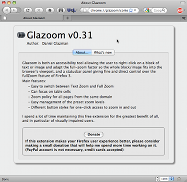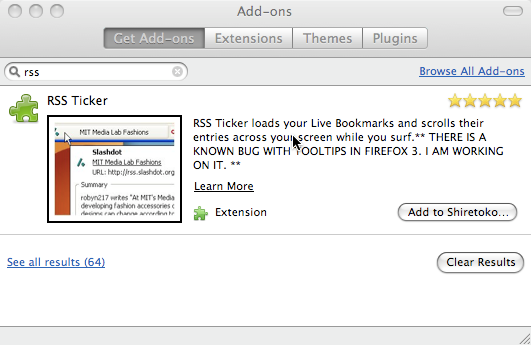
Example of extension's tab as proposed in item 7 above (click to enlarge)
The Mozilla software ecosystem consists of Mozilla products, Mozilla-based products, and extensions to these products. Most extensions to Mozilla-based products are freely available on the Web, and do not provide their authors with a revenue stream. If this is excellent for the community and for the software diversity on the Web, it's not the best win-win strategy for the Mozilla ecosystem and extensions' authors themselves: since they cannot make a revenue - even minimal - from their hard work, they cannot invest too much time on code. A successful and free extension driving a lot of feedback and expectations from the users, it's then difficult for the author to stay in sync with the evolutions of the Mozilla code-base and users's feedback.
This document will try to summarize the current situation and propose some changes to the Mozilla ecosystem that could trigger a revenue stream for code contributors in the Mozilla community, and hence an expansion of the Mozilla ecosystem itself.
The following is well-known but will serve as a basis for the discussion:
Metrics:
Even if the iPhone's Application Store lives in a totally different system, these numbers must be compared to the following ones:
A lot of software developers are attracted by the iPhone platform (a lot of them never really worked on Mac before but moved to Mac OS X because of the iPhone) for the following reasons:
Even if the Mozilla ecosystem is a vibrantly alive community, it probably does not reach its full potential because it misses two important factors:
There are a lot of things to learn from the App Store, and I think the Mozilla ecosystem could be adapted to trigger even more innovation and diversity on the World Wide Web without changing at all the core values and goals of Mozilla.
Donations and retributions for a given extension could be generated from two sources: addons.mozilla.org's page for this extension and the product hosting the extension.
I think there is a consensus in the Mozilla community about the following points (please note I am not saying the Mozilla community is right thinking that, I'm only quoting a fact):
The following points must also be considered:
The extensions manager of these products is clearly a focal point for extension authors. It's often the user's first contact with addons.
For the time being, the
extensions manager is unable to host a link
to a donations page or show the release notes for a given extension.
It's possible to have a link to a "home page URL" in the extension's
install.rdf but using this URL is not very satisfactory:
homepageURL before first upload
since the extension's ID on
addons.mozilla.org is not know yet!install.rdf is then more a "Author's web
site URL" and the
"home page URL" should target addons.mozilla.org.There is also no UI guideline for an extension's author willing to add a "Donate" button to his/her extension. Where is a such a button acceptable? Where is it intrusive? How can we avoid multiple and confusing UI styles for Donation buttons?
It's then proposed to:
donateURL field to
extensions' install.rdf file,install.rdf,donateURL field is present along the
Enable/Disable and
Uninstall buttons,donateURL field is present, because this
dialog is often
linked from the extension's chrome itself,authorpageURL field to
extension's install.rdf file that
will serve as the current homepageURL,install.rdf
as the homepageURL field,homepageURL
(addons.mozilla.org if the extension was
downloaded from there),donateURL field is present
for this extension.donateURL
for an extension is stored safely, i.e. is not overridable by another
extension.
Example of extension's tab as proposed in item 7 above (click to
enlarge)
It's also proposed to revamp almost entirely the "Get add-ons" tab of the extensions manager for the following reasons:

Search for "rss": one result only, while addons.mozilla.org replies 133
results...
This dialog should then be
Ideally, the search for addons could be based on a real search engine registered in the search engine dropdown menu of Firefox. That would enable third-party extension lookup dialogs.
Despite of the huge interest of XULrunner for standalone Mozilla-based applications and the fact Firefox 3 is able to run packages made for XULrunner, this way of writing standalone applications did not really spread. There are many reasons for that but one of them is the lack of an Application Store like the iPhone's and the command-line interface needed to run a package through Firefox 3.
With a vastly improved JavaScript speed and new HTML elements like canvas, JS-based games, video effects software and image editing software based on web standards are becoming a reality. But we have no distribution channel at this time for this kind of packages so we don't and won't attract easily developers.
It's then proposed to:
application.ini file for these packages
to host a donateURL field,Addons.mozilla.org drives an incredible web traffic, financially supported by the Mozilla Corporation. Despite of the cost, this is a very successful strategy for Mozilla because the existence of thousands of add-ons for Firefox and other Mozilla products is clearly a big differentiating factor with other mainstream browsers. So the existence of add-ons and the hard work of extension contributors are extremely beneficial to Mozilla.
So ideally, Mozilla should do much more for extension contributors than only provide them with infrastructure only. I am only thinking at loud here, but an addon page hosting selected ads could drive a lot of income for its author.
The different possibilities are the following ones:
Mozilla Corporation, Mozilla Messenging. Why not a Mozilla Add-ons Corporation? As I said in section 3.1, the Mozilla community currently thinks that addons.mozilla.org is not the right place to sell extensions to Mozilla products. I think this is a very wrong choice, that is counter-productive and does not push the add-ons ecosystem of Mozilla towards its full potential.
I think a Mozilla Add-ons Corporation could be formed to manage addons.mozilla.org AND the revenue streams it could trigger if sold add-ons were available on the site:
That said, can it happen outside of addons.mozilla.org? The answer is no, loud and clear. Addons.mozilla.org is and will remain the focal point of the addons ecosystem and it's unrealistic to imagine there could be one site for free add-ons and another one for sold add-ons.